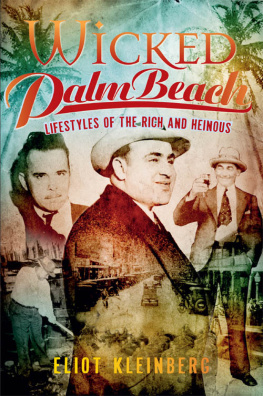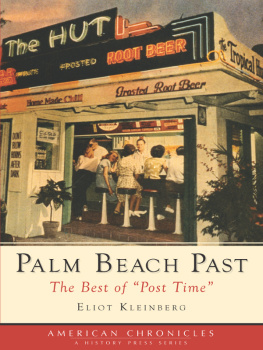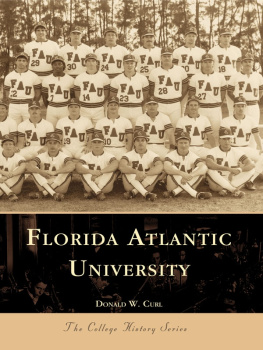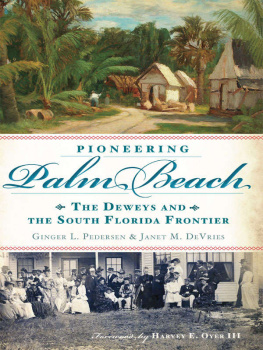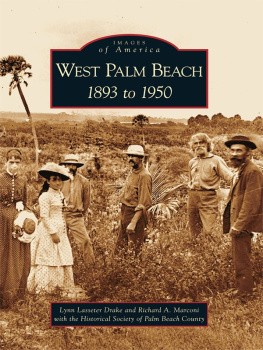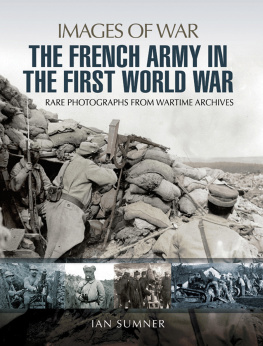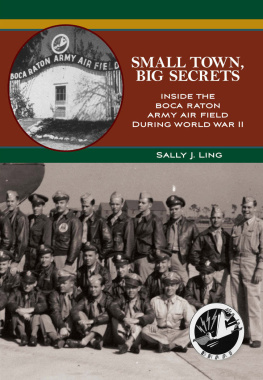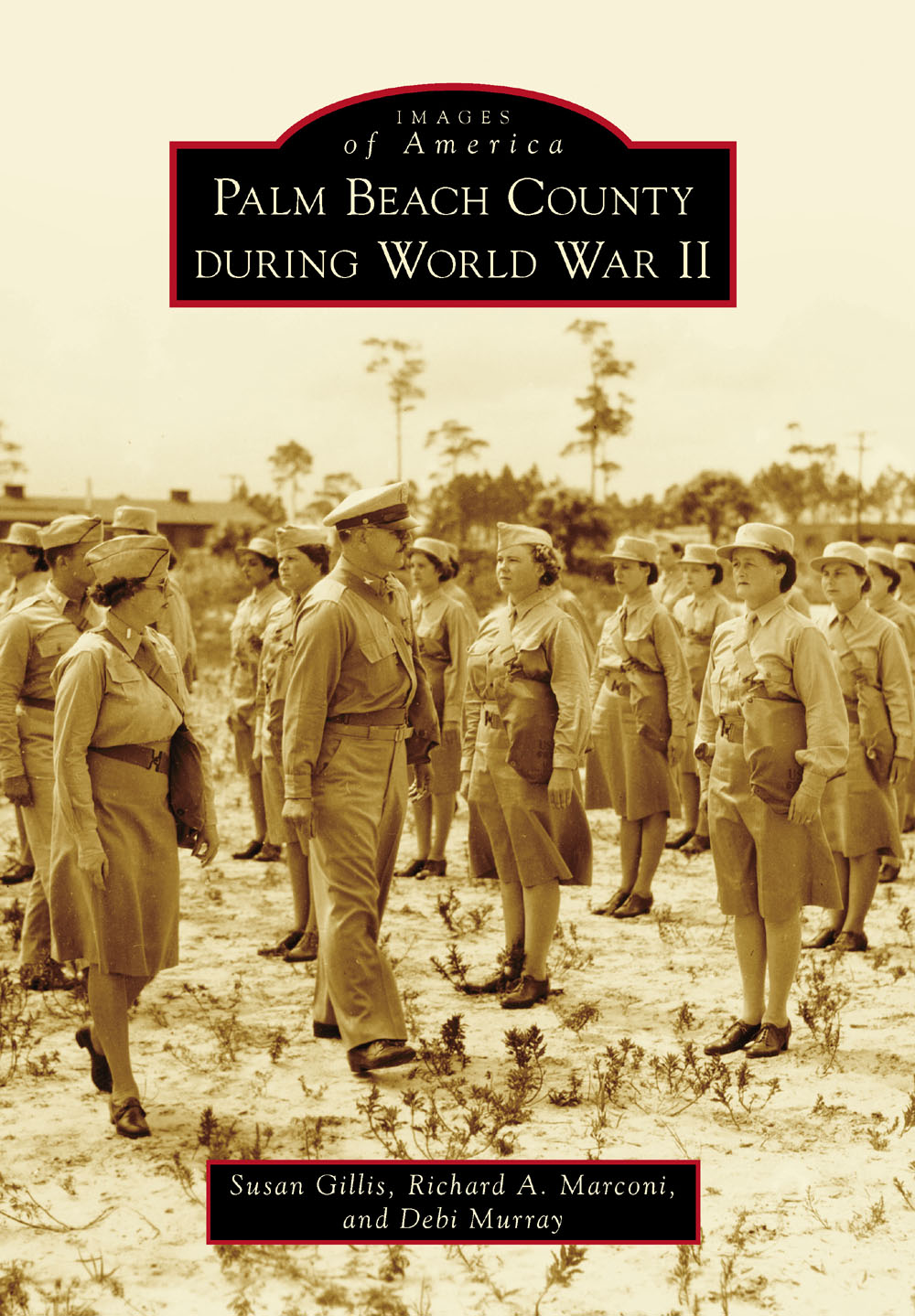
IMAGES
of America
PALM BEACH COUNTY
DURING WORLD WAR II
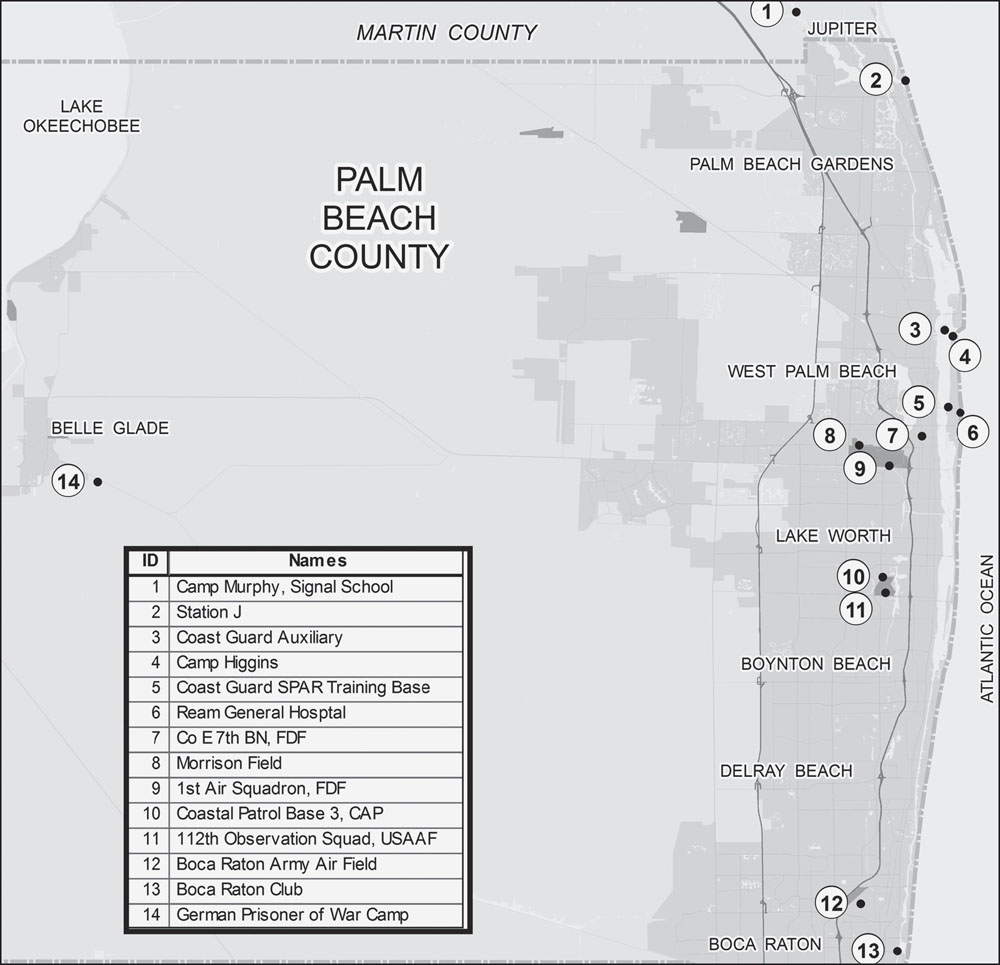
During World War II, Palm Beach County was a beehive of activity. The map illustrates the various locations of the different military and volunteer bases in the county, including a prisoner-of-war camp in Belle Glade. All the branches of military served in the county. (Richard Randall.)
ON THE COVER: In May 1943, the Boca Raton Army Air Field received its first group of Womens Army Auxiliary Corps (WAACs), which became the Womens Army Corps (WACs) in July 1943. These women served in a wide variety of base support functions. WAC uniforms were notoriously ill-fitting and uncomfortable in the Florida climate. These WACs do not seemed pleased to be suffering through yet another inspection. (Boca Raton Historical Society & Museum.)
IMAGES
of America
PALM BEACH COUNTY
DURING WORLD WAR II
Susan Gillis, Richard A. Marconi,
and Debi Murray

Copyright 2015 by Susan Gillis, Richard A. Marconi, and Debi Murray
ISBN 978-1-4671-1401-1
Ebook ISBN 9781439652053
Published by Arcadia Publishing
Charleston, South Carolina
Library of Congress Control Number: 2014959794
For all general information, please contact Arcadia Publishing:
Telephone 843-853-2070
Fax 843-853-0044
E-mail
For customer service and orders:
Toll-Free 1-888-313-2665
Visit us on the Internet at www.arcadiapublishing.com
This book is dedicated to the men and women who served our country during World War II. Without their sacrifice, the world would not be free.
CONTENTS
ACKNOWLEDGMENTS
We would like to thank Maggie Bullwinkel for her encouragement during the writing of this book and the Historical Society of Palm Beach County (HSPBC), the Boca Raton Historical Society & Museum (BRHSM), the US Air Force Historical Research Agency (USAFHRA), and the Florida State Archives (FSA) for the use of their extensive collections of photographs and research material. Without it, this book would not have been possible.
For the information on the Boca Raton Army Air Field and Boca Raton during World War II, we would like to express our sincere thanks to Sally Ling for her book Small Town, Big Secrets (2005). This book would not have been possible without her extensive research and information about the minute details of everyday life at BRAAF. The information gathered for her book is now available in the collections of the Boca Raton Historical Society & Museum. The following represent the veterans and civilians whose photographs and memories have made this book possible: Jim Barnt, Martha and Peter Barrett, Richard H. Becker, Charlie Bender, Stan Biedron, Archie and Irene Carswell, Manny Chavez, William Coburn Clark, Louis Delgado, Eldra Durham, Frank Fisher Jr., Phil Kantor, Edith Mize Lewis, Harry Magafan, Anne Maguire, Ed Malavarca, Orlo Maxfield, James McCrudden, Bill Murden, Waino Ray, Paul Schweisburg, Charles Winslow Skeele, and Alvin Thiele.
INTRODUCTION
Fearing attack on the mainland after the devastation at Pearl Harbor, Hawaii, civilians and military personnel alike prepared to defend their country. The threat of invasion from both Japan and Germany seemed very real. Florida residents could hear explosions and see evidence of the danger lurking just offshore, when Allied ships were left drifting, ablaze and sinking, their crews awaiting rescue or dying after attacks by U-boats.
Nearly everyone in the United States, from children to those long past retirement, participated in some way to help defeat Germany, Japan, and Italy during World War II. Children helped collect scrap materials. Adults and teenagers volunteered for civil defense, manning coastal watchtowers or acting as blackout wardens. American Red Cross volunteers taught first-aid courses, rolled bandages, and otherwise prepared for invasion by Germany. Men and women enlisted in the military in numbers never seen before. New military bases and even a prisoner-of-war camp were built in Palm Beach County. War was no longer something happening far awaywar was at the doorstep.
During World War II, Palm Beach County was an integral cog in the war machine established by the Allies against the Axis powers. From Jupiter to Boca Raton, various branches of the military operated numerous facilitiesfrom convalescent hospitals to training centers and spying on German communications. Palm Beach County was a dynamic and vibrant hub of military activity. The first of these, and the longest-lasting, was Morrison Field Army Air Base, located at what is now Palm Beach International Airport.
For 17 months, a group of volunteers serving in the Civil Air Patrol helped fight one of the biggest threats to our countrys safety: German submarines called U-boats. They hunted their prey along the East Coast of the United States and in the Gulf of Mexico. Men and women of the Civil Air Patrol volunteered their time and resources to help protect our shores from the U-boat menace.
The US Army began construction of Boca Raton Army Air Field on 5,820 acres in south Palm Beach County in May 1942. Of the 831 buildings on the base by August 1943, there were 11 mess halls, 3 chapels, 50 recreation buildings, 6 hangers, 335 enlisted barracks, 20 officer barracks, 16 school buildings, and 9 stores. As many as 100,000 servicemen and women trained or worked at the field before it closed in 1947.
When regular Coast Guardsmen were assigned to war duties overseas, volunteers once again stepped into the breach. Members of Coast Guard Temporary Reserves Flotilla 3, Division 2, were proud to call themselves members of the Hooligan Navy. The men used their own boats, usually unarmed, to assume the duties the Coast Guard typically performed. Since boat traffic in general was curtailed, they did not have to rescue many day sailors or fishermen, but they played a vital role in rescuing merchant marine crewmen from torpedoed ships. The womens component of the Coast Guard converted the Biltmore Hotel into a training base for enlisted personnel.
The Palm Beach County Chapter of the American Red Cross also relied on volunteers to work at the military bases, training centers, railroad stations, and hospitals around Palm Beach County, where they manned canteens, helped patients, and provided assistance to the troops. With gas rationing leaving many families without transportation, the motor corps drove other volunteers to their posts, transported civilians to medical appointments, and took convalescing servicemen and women on outings. They supplied survivors from merchant ships attacked by U-boats with medical care, clothing, food, lodging, and transportation home. In every goal set by the National American Red Cross for individual chapters, from people trained in first aid to fundraising, Palm Beach County exceeded its quota.
World War II was the last war to affect all aspects of American life. The government instituted rationing of gasoline, manufactured goods, and food, especially sugar and coffee. Civilians collected newspapers, aluminum, rubber, and even bacon grease for the war effort. Blackouts and air raid warnings became regular occurrences.
After V-E Day, focus at the local airfields switched to the Pacific; Morrison Field had plans extending through July 1946 to prepare planes and crews for the push against Japan. V-J Day and the end of the war changed everything. The military and civilians alike began the process of welcoming returning soldiers. Trainloads of soldiers traveled north from Miami, stopping at various stations along the way, including West Palm Beach. Service clubs, including the Jaycees, American Red Cross, Womans Club, and Scouting organizations met each train, passing out goodies such as watermelon and soft drinks to the homebound servicemen.
Next page

